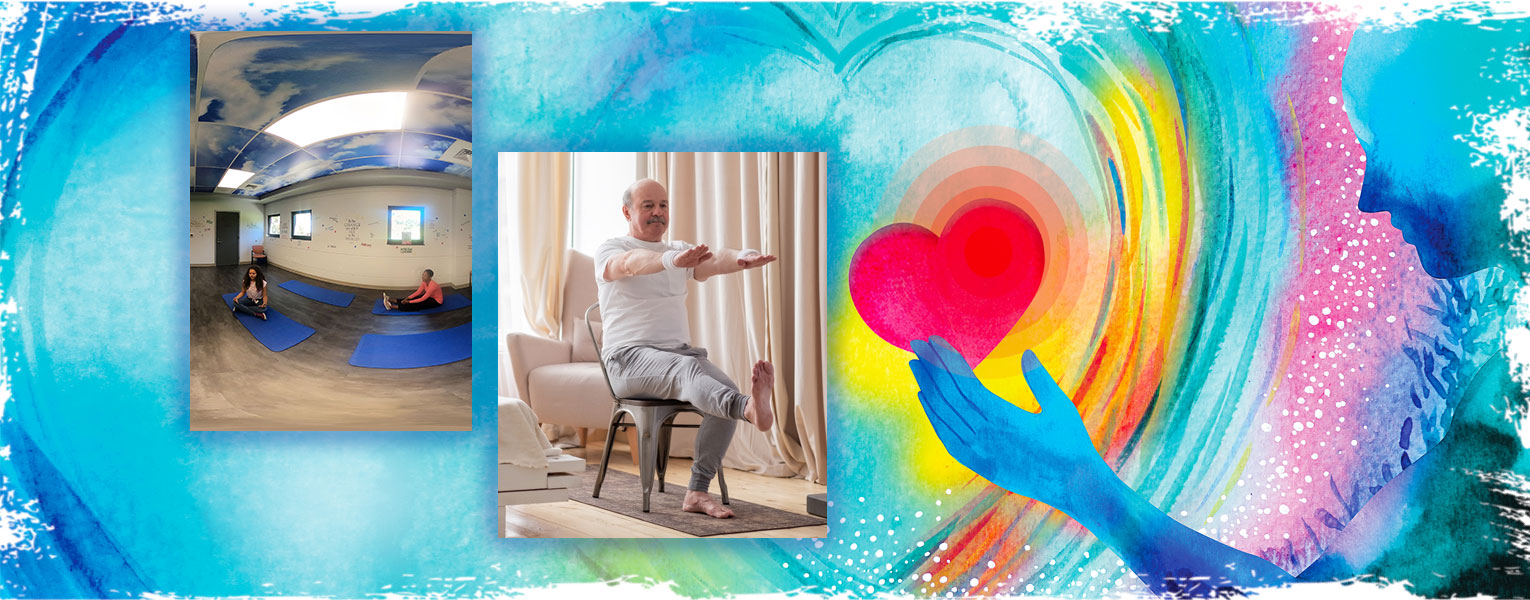7/24/2023
Healing the Mind, Body and Soul
From Chronic Pain to Heart Failure to Healthy Aging, FAU Researchers are Developing Strategies and Solutions to Improve Our Quality of Life
Florida Atlantic is improving quality of life for all by investigating and developing strategies and solutions to address various conditions that impact humans globally. From chronic pain to heart failure to healthy aging, FAU researchers are unraveling the complex interrelationship between mind, body and soul using science-based and holistic approaches.
Among these strategies is an innovative pilot project using focused ultrasound to treat chronic pain, which received a successful review from ABC’s “Shark Tank” and funding from the National Institutes of Health. Focused ultrasound is a noninvasive therapeutic technique that directs ultrasonic waves to a specific location. FAU researchers are collaborating on developing a handheld probe to provide the non-opioid-based treatment for aggravated chronic pain, also referred to as neuropathic pain, for use in a physician’s office or potentially even at home.
The device directs low-intensity ultrasound at the dorsal root ganglia, which are small bundles of nerves along the spine that control pain signals reaching the spinal cord. The handheld applicator integrates ultrasound imaging and therapy and is designed to accommodate differences in human anatomical size. As a result, the treatment device and methodology provide means for precise treatment of back and leg pain.
“Pain is one of the most common reasons patients seek medical care. Importantly, neuropathic pain, when treated with opioidbased drugs, has led to addiction in some patients,” said Julie Pilitsis, M.D., Ph.D., dean and vice president for medical affairs in FAU’s Charles E. Schmidt College of Medicine. “There is a great unmet need to provide more effective, safer and financially sustainable therapies for patients in pain. Ideally, with this therapy, patients can avoid hospitalization and days off work by reducing pain and enabling function.”
Pain also is associated with less time spent being physically active, especially in older adults. Physical activity helps prevent functional decline, frailty, falls and chronic conditions such as diabetes and cardiovascular disease. Regular physical activity also contributes to quality of life and reduced depression.
Despite these known health benefits, older adults seldom meet the physical activity guidelines of 150 minutes per week of moderate activity. Many factors affect physical activity levels among older adults. Moreover, little is known about the differences in physical activity among various racial and ethnic groups.
FAU Christine E. Lynn College of Nursing researchers conducted a first-of-its-kind study using a robust statistical approach to analyze the factors related to physical activity in a diverse sample of older adults ages 59 to 96 living independently. While prior studies have addressed the question of factors influencing older adults’ physical activity levels, none have employed the large range of instruments/ tools used in this study or included older adults from multiple ethnic groups.
Findings showed that age, education, social network, pain and depression were the five factors that accounted for a statistically significant proportion of unique variance in physical activity in this diverse, community-dwelling older population.
“Four of the five significant predictors of physical activity in the older adults we studied are at least partially modifiable. For example, social network, depression and pain can be ameliorated by physical activity,” said Ruth M. Tappen, Ed.D., RN, FAAN, the Christine E. Lynn Eminent Scholar and professor in the Christine E. Lynn College of Nursing. “Education may be key both in helping older adults with depressive symptoms understand that physical activity can help reduce their symptoms and in helping them to identify the types of activity that they may find enjoyable.”
One activity that older adults may find enjoyable is yoga, which evokes physical, mental and emotional awareness. For older adults with dementia, yoga can be practiced sitting or standing using a chair for support. Chair yoga combines flexibility, balance, strength, breathing, relaxation and mindfulness training.
Unfortunately, many barriers exist for this population such as a lack of transportation, living in rural areas, relying on caregivers, and especially the COVID-19 pandemic that prevented many older adults with dementia from participating in group-based in-person chair yoga classes.
A research team – led by FAU’s College of Social Work and Criminal Justice in collaboration with the College of Nursing and College of Medicine – conducted an interdisciplinary study to evaluate a remotely supervised online chair yoga intervention targeted at older adults with dementia, measuring clinical outcomes virtually via Zoom under the remote guidance. The study assessed the feasibility of this intervention and explored the relationship between chair yoga and clinical outcomes of pain interference, mobility, risk of falling, sleep disturbance, autonomic reactivity and loneliness.
Participants in the pilot study took part in twice weekly, 60-minute sessions for eight weeks. They worked with a certified yoga interventionist and their caregivers and practiced breathing techniques and intentional practice, physical postures and guided relaxation and visualization.
Study results showed that remotely supervised online chair yoga is a feasible approach for managing physical and psychological symptoms in socially isolated older adults with dementia based on retention (70 percent) and adherence (87.5 percent), with no injury or other adverse events.
“Our telehealth-based chair yoga intervention was found to be convenient for both participants and their caregivers because it was easily accessible from home and did not require transportation or getting dressed, which reduced caregiver burden and stress,” said Juyoung Park, Ph.D., professor in the Phyllis and Harvey Sandler School of Social Work in FAU’s College of Social Work and Criminal Justice.
By once again combining disciplines — specifically engineering and nursing — a new FAU device is showing great promise for monitoring heart failure. More than 64 million people worldwide suffer from heart failure, which is a progressive clinical syndrome characterized by a structural abnormality of the heart, whereby it is unable to pump sufficient blood to meet the body’s requirements.
Researchers from FAU’s College of Engineering and Computer Science and College of Nursing have developed a prototype of a novel wearable device that continuously monitors physiological parameters associated with heart failure in real time. The technology is based on sensors embedded in a lightweight belt conveniently worn around the waist to monitor thoracic impedance, electrocardiogram, heart rate and motion activity detection. The system uses different sensors to monitor these parameters. Researchers tested the wearable device in different conditions including sitting, standing, lying down and walking. For each condition, results were obtained for each of the sensors sequentially. The physiological parameters selected are significant in determining heart failure symptoms.
Findings show the sensors kept track of changes for all of the different conditions. The position sensor correctly highlighted the change in position in different conditions and could be used to identify different states of the wearer of the device.
“All of the sensors we integrated into our belt module can easily be worn for a long time without affecting the patient’s daily activities,” said Waseem Asghar, Ph.D., associate professor in FAU’s College of Engineering and Computer Science. “Importantly, continuous and real-time monitoring of heart failure symptoms could alert patients and their health care providers of the patient’s declining health. In turn, health care providers could intervene with medications to avoid patient hospitalization.”
Across the spectrum, FAU’s commitment to optimal health and healing focuses on the whole person to provide solutions for a range of chronic physical and mental conditions. Through integrative health practices, patients and participants can take more control of their own quality of life rather than relying solely on pharmaceuticals or invasive procedures.
Two FAU centers in particular — the Robin Rubin Center for Happiness & Life Enhancement and the Marcus Institute of Integrative Health at FAU Medicine — are dedicated to enriching and nurturing physical, mental, emotional and spiritual well-being.
The Robin Rubin Center for Happiness & Life Enhancement was established to broaden the reach of Rubin’s initial goal — to teach the skills and tools of happiness and, more importantly, how to put them into practice. Rubin, a two-time FAU alumna and instructor in the Sandler School of Social Work, provides a space within her center where students, faculty, staff and community members can enhance and improve their well-being while fostering a culture of authentic connection. Among the complimentary programs offered to the public are weekly meditations, in-person yoga classes, and monthly wellness workshops — all designed to empower participants to prioritize self-care.
At the Marcus Institute of Integrative Health at FAU Medicine, FAU physicians provide an evidence-based, patient-centered approach to care that may include conventional, as well as nonpharmaceutical treatments. These complementary approaches provide physicians with the best methods for providing wellcoordinated care.
Common integrative health services include osteopathic manipulation and massage, yoga, meditation, culinary medicine, and nutrition and dietary guidance. Patients may seek integrative health services for conditions such as back, neck or joint pain; arthritis; anxiety; cholesterol and heart disease; head or chest colds; other musculoskeletal issues; headaches and migraines; and insomnia, for example. Patients who seek an integrative health physician tend to experience difficult-to-treat conditions and have tried conventional treatments with little or no success of longterm improvement.
The Robin Rubin Center for Happiness & Life Enhancement and the Marcus Institute of Integrative Health recently joined forces to provide the second annual “New Year Wellness Series for Mind, Body and Spirit.” The program focused on emotional, nutritional, mind/body, spiritual and mental wellness as well as brain health. “Thank you all at FAU for the wonderful mindful series each Friday. They have truly helped me get through this year more calmly and more grounded, and I have experienced much needed peace and comfort,” said Pamela Harvard, program attendee. “With a sister in the hospital, working full time, car breaking, and so many other issues, being able to rely on faith and the things I’ve learned in the meditation series and lectures were so helpful to me. It’s been a truly uplifting and welcoming portion of my week.”
If you would like more information, please contact us at dorcommunications@fau.edu.

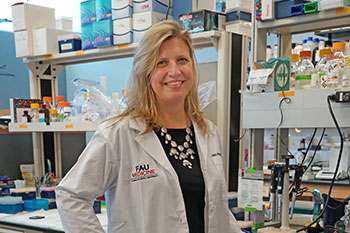
There is a great unmet need to provide more effective, safer and financially sustainable therapies for patients in pain.”
— Julie Pilitsis, M.D., Ph.D.
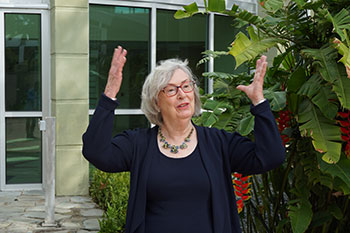
Four of the five significant predictors of physical activity in the older adults we studied are at least partially modifiable. For example, social network, depression and pain can be ameliorated by physical activity.”
— Ruth M. Tappen, Ed.D., RN, FAAN
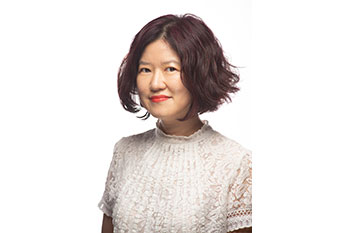
Our telehealth-based chair yoga intervention was found to be convenient for both participants and their caregivers because it was easily accessible from home and did not require transportation or getting dressed.”
— Juyoung Park, Ph.D.
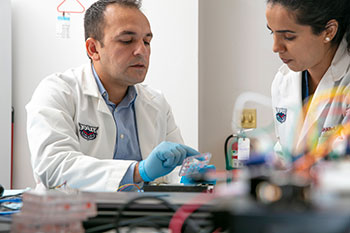
Continuous and real-time monitoring of heart failure symptoms could alert patients and their health care providers of the patient’s declining health.”
— Waseem Asghar, Ph.D.
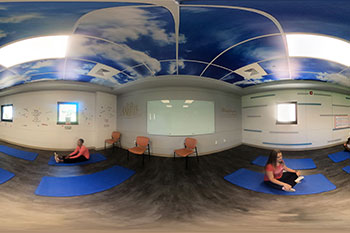
Yoga at the Robin Rubin Center for Happiness & Life Enhancement
Learn more:
Robin Rubin Center for Happiness & Life Enhancement:
www.fau.edu/sw-cj/ssw/happiness
Marcus Institute:
www.faumedicine.org/integrative-health
